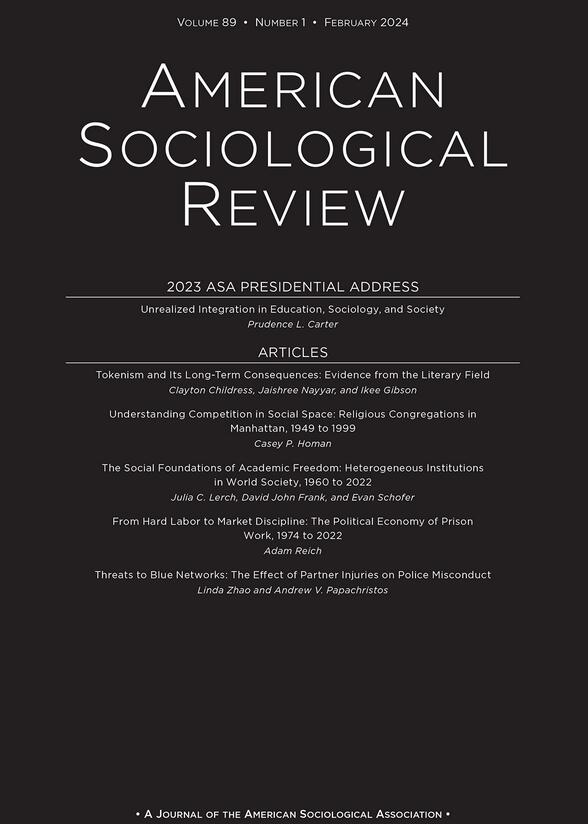Unrealized Integration in Education, Sociology, and Society
IF 6.2
1区 社会学
Q1 SOCIOLOGY
引用次数: 0
Abstract
In the 2023 ASA presidential address, Prudence Carter delves into the landscape of U.S. society, tracing some of its historical progress and confronting contemporary social, economic, educational, and political challenges. Central to her argument is an exploration of the concept of “unrealized integration” and how it has hindered the nation’s march toward an inclusive, multiracial democracy. Carter describes and characterizes the current state of integration within education and society. Despite the widespread rhetoric of diversity in our organizations and institutions, she critiques its shallow application, exposing diversity’s inability to rectify imbalances of power- and resource-sharing. Incorporating the idea of “tipping points,” she discusses how civil rights movements, despite expanding representation and opportunity, have faced recurrent waves of political backlash and reversals. She contends that an erosion of social progress occurs when there is an imbalance in the pursuit of distributional equality (concerning material resources) and relational equality (involving social and cultural dynamics and processes that shape well-being). Additionally, she identifies three other crucial areas that warrant focus to pave the path toward realized integration within education and society. In a forward-looking call to arms, Carter underscores the imperative for sociologists to transcend epistemological and methodological boundaries; and she advocates for robust collaborations across the social sciences and humanities to harness the collective power of knowledge-generation and solution-building for pressing societal issues.教育、社会学和社会中未实现的融合
在 2023 年亚裔美国人协会主席演讲中,普鲁登斯-卡特深入探讨了美国社会的面貌,追溯了美国社会的一些历史进步,并直面当代社会、经济、教育和政治挑战。她的核心论点是探讨 "未实现的融合 "这一概念,以及这一概念如何阻碍了美国迈向包容、多种族的民主社会。卡特描述了教育和社会融合的现状,并指出了其特点。尽管在我们的组织和机构中普遍存在着多样性的言论,但她批评了其肤浅的应用,揭露了多样性无法纠正权力和资源共享的不平衡。她结合 "临界点 "的概念,讨论了民权运动尽管扩大了代表性和机会,但如何面临一轮又一轮的政治反弹和逆转。她认为,如果在追求分配平等(涉及物质资源)和关系平等(涉及社会和文化动态以及影响福祉的过程)方面出现失衡,社会进步就会受到侵蚀。此外,她还指出了其他三个值得关注的关键领域,以便为实现教育与社会的融合铺平道路。在前瞻性的号召中,卡特强调社会学家必须超越认识论和方法论的界限;她倡导社会科学和人文学科之间开展强有力的合作,利用知识生成和解决方案建设的集体力量来解决紧迫的社会问题。
本文章由计算机程序翻译,如有差异,请以英文原文为准。
求助全文
约1分钟内获得全文
求助全文
来源期刊

American Sociological Review
SOCIOLOGY-
CiteScore
13.30
自引率
3.30%
发文量
35
期刊介绍:
The American Sociological Association (ASA) is a non-profit membership association established in 1905. Its mission is to advance sociology as a scientific discipline and profession that serves the public good. ASA is comprised of approximately 12,000 members including faculty members, researchers, practitioners, and students in the field of sociology. Roughly 20% of the members work in government, business, or non-profit organizations.
One of ASA's primary endeavors is the publication and dissemination of important sociological research. To this end, they founded the American Sociological Review (ASR) in 1936. ASR is the flagship journal of the association and publishes original works that are of general interest and contribute to the advancement of sociology. The journal seeks to publish new theoretical developments, research results that enhance our understanding of fundamental social processes, and significant methodological innovations. ASR welcomes submissions from all areas of sociology, placing an emphasis on exceptional quality.
Aside from ASR, ASA also publishes 14 professional journals and magazines. Additionally, they organize an annual meeting that attracts over 6,000 participants. ASA's membership consists of scholars, professionals, and students dedicated to the study and application of sociology in various domains of society.
 求助内容:
求助内容: 应助结果提醒方式:
应助结果提醒方式:


